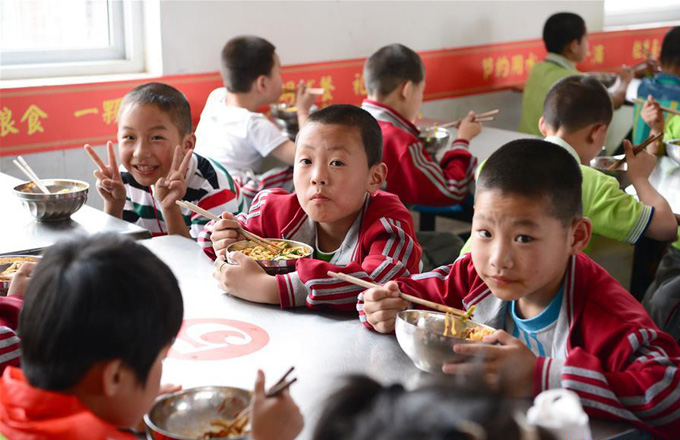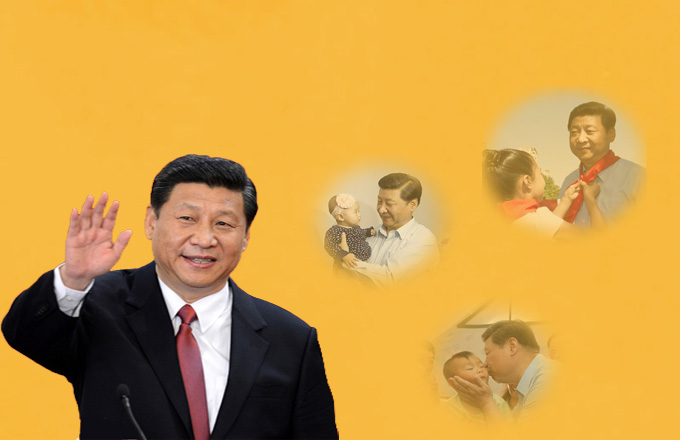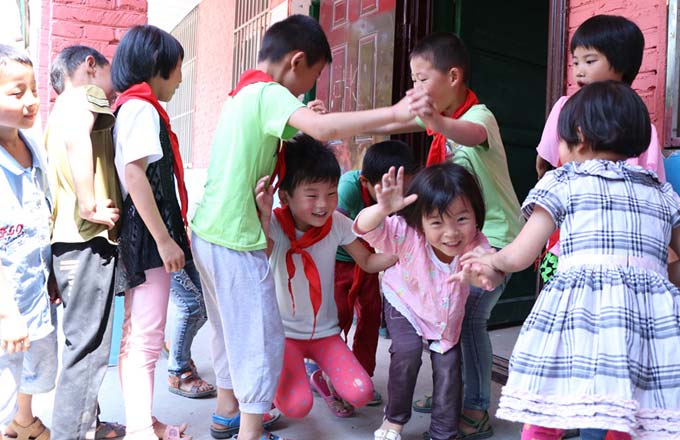Full Text: Human Rights in Xinjiang - Development and Progress
VIII. Rights of Women, Children, the Elderly and Disabled
The Xinjiang Uygur autonomous regionrespects and guarantees the rights of women, children, the elderly and the disabled, who enjoy all civil rights on an equal footing in accordance with the law. Both the central and the autonomous regional governments have taken targeted measures to meet their special needs.
Women's rights have been safeguarded. Xinjiang has gradually created and improved a range of systems for safeguarding women's rights and interests, by eliminating gender discrimination in employment, ensuring that men and women get equal pay for equal work, promoting women's employment and encouraging and helping women to start businesses, and strengthening special labor protection for women employees. Steady increase has been observed in the number of women participating in the management of public affairs; female officials increased in number from 14,661 in 1955 to 435,000 in 2015. The autonomous region prevents and strikes hard at serious crimes encroaching upon women's right of the person, including the rape, abducting and trafficking of women, and organized and forced prostitution. It implements the Anti-domestic Violence Law of the People's Republic of China and the Regulations of the Xinjiang Uygur autonomous regionon Preventing and Prohibiting Domestic Violence and explores joint-action mechanisms against domestic violence, and has set up pilot "anti-domestic violence work stations." Free cervical cancer and breast cancer screening has been held for women living in urban communities, and free health examination for impoverished women. By the end of 2016, 95.45 percent of pregnant and lying-in women were receiving prenatal examination, the hospital delivery rate had reached 98.78 percent, and the mortality rate of pregnant and lying-in women had dropped to 33.14 per 100,000.
Children's rights have been fully protected. By the end of 2016, the mortality rates of infants and children under the age of five had dropped to 16.43 per thousand and 26.31 per thousand, respectively, and the EPI (endemic planned immunization) coverage rate had surpassed 90 percent. The autonomous region has carried out a series of programs, including the Spring Bud Project, Happy Homes for Children, Heng'ai Action, Reborn Action- the poor family's children with cleft lip and palate operation rehabilitation program - and the Chunmiao Project - a program that provides free medical care to children in Xinjiang who suffer from congenital heart diseases. It has established a network for the protection of homeless children and a mechanism for early prevention and intervention in this regard. It took the lead in the country to start the program of "taking street children home", by such means as improving mechanisms for the life, education, management, return, placement and security of vagabond children, and correcting some serious misbehavior. The autonomous region has established more professional service organizations for nursing and caring for the orphaned and disabled children, protecting street children, and rehabilitating disabled children. The minimum basic living standard for orphans in welfare institutions has increased from RMB360 per month in 2009 to RMB900 per month in 2016. A special project has been carried out on the joint guardianship of left-behind children in rural areas to strengthen intervention over and assistance to key individuals, especially the unsupervised, with a view of providing all rural left-behind children with effective guardianship by the end of 2017. Primary attention has been made on improving children service systems at county, township and village levels, and on building a protection and assistance mechanism incorporating compulsory reporting, emergency disposal, assessment and assistance, and guardianship and intervention. Ten courts have set up independent comprehensive juvenile tribunals, in addition to 24 fixed collegial panels and 42 courts that appoint special personnel to handle juvenile cases. There are in total 215 trial judges who are directly involved in the trial of juvenile cases in Xinjiang.
The mechanism for protecting the rights of the elderly has constantly improved. To meet the multi-level and diverse healthcare needs of the elderly, the autonomous region promotes the coordinated development of universal and customized services. It has increased coverage of community-based care for the elderly, and has explored day-care for the elderly and other ways within communities. From 2010 to 2016, Xinjiang had invested a total of RMB4.18 billion in building 504 nursing institutions for the aged, RMB430 million in building care centers for elderly people with disabilities and dementia, and RMB81 million in building nursing homes, social welfare institutes, township service and welfare centers, community day-care centers, rural elderly people's homes and other programs. It has also formulated and implemented policies whereby government purchases pension services, and welfare institutions are founded by government but operated privately. By the end of 2016, there were 1,998 social organizations and institutions, 4,328 full-time and part-time personnel, and 47,053 volunteers providing services for the aged. Xinjiang has also set up and improved an old-age network at five levels - autonomous region, city (prefecture), county (county-level city, district), township (residential district) and village (community).
Marked progress has been made in the protection of the rights and interests of the disabled. Xinjiang has now 1.07 million people with disabilities. Of these, 225,000 are covered by the subsistence allowances for urban and rural residents, and 298,000 have participated in the basic old-age insurance schemes respectively for urban and rural residents. Personal contributions of the disabled living under the prescribed poverty lines are paid by the government on their behalf. 40,000 people with severe disabilities have been provided with nursing services, and 364,000 impoverished people with disabilities and severe disabilities have been granted living allowances and nursing subsidies. Xinjiang has implemented national key rehabilitation programs and regional rehabilitation, relief and care projects for impoverished disabled people. It now has 168 rehabilitation institutions of various types and 1,738 community rehabilitation centers. By the end of 2016, it had provided rehabilitation treatment and service to 1.14 million recipients, performed 214,300 cataract operations, and distributed 156,900 assistive devices for free. The autonomous region endeavors to build barrier-free environments in cities and counties, and has carried out barrier-free transformation for 25,360 impoverished households with disabled family members. By the end of 2016, 67,000 jobs had been provided to disabled people in urban areas, and 223,000 to those in agricultural and pastoral areas. Colleges and universities generally recruit students with disabilities. In total, 7,537 disabled students are now studying in general elementary and secondary schools, and 2,927 in 29 special education schools. 747 vocational training bases have provided training to a total of 110,000 disabled people in urban and rural areas, and the illiteracy rate of the disabled has dropped from 57 percent in 1987 to today' s 31 percent. Xinjiang has built 358 poverty alleviation bases for the disabled, and has provided support to more than 20,000 people with disabilities to improve their living conditions. The autonomous region and more than half of its cities (prefectures) have developed special broadcasting programs for people with disabilities and TV news programs in sign language, set up 16 Braille and audio book reading rooms for the blind, and built five sports training bases for people with disabilities. In the Beijing Paralympic Games, London Paralympic Games and other major sports events, disabled athletes from Xinjiang have won 201 gold medals, 132 silver ones and 125 bronze ones. Organizations for disabled persons are found in 1,073 townships (residential districts) and 9,207 communities (villages), and 226 legal assistance, coordination and working organizations have provided legal services to 167,564 recipients.
The socialist system with Chinese characteristics has provided a solid institutional guarantee to human rights development in Xinjiang; the rapid economic and social development has provided a solid material foundation; and the harmonious and stable political environment has ensured a satisfactory social environment. It is a principle of the Constitution to respect and protect human rights. To promote progress in human rights is the consistent pursuit of all Chinese people, including the ethnic groups of Xinjiang. Under the leadership of the Communist Party of China and the Chinese government, and with the realization of the Two Centenary Goals and the Chinese Dream of rejuvenation of the Chinese nation, further improvement will be seen in the protection of human rights in Xinjiang, and all ethnic groups in Xinjiang will be sure to greet a brighter future.
- China offers new idea on human rights governance
- China issues report on US human rights
- Work together to promote and protect human rights
- Peace is fundamental premise, foundation for human rights protection: Chinese diplomat
- A Comparative Study on Human Rights Development Approaches in China and U.S.(Special Issue No.48 2016)
























